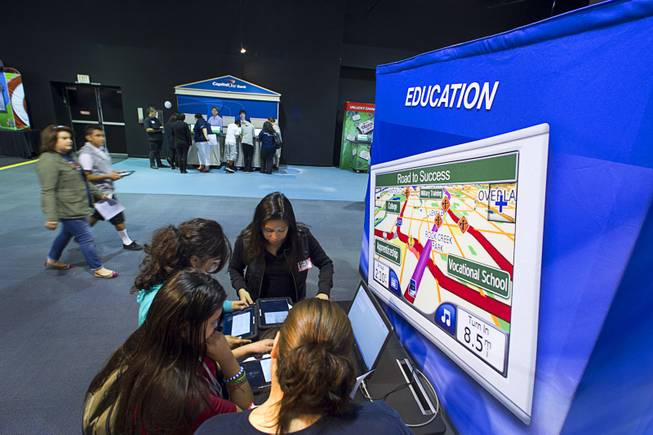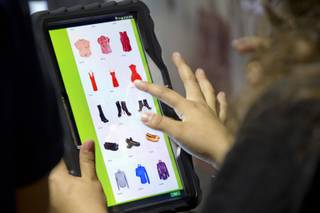
Students make decisions about education expenses at the Capital One Junior Achievement Finance Park at the Las Vegas Library Wednesday, Oct. 15, 2014. The program teaches financial responsibility through role play. Students are given jobs, salaries, bills and other limitations with the goal of learning how to manage money.
Thursday, Oct. 16, 2014 | 2 a.m.
Itzel Rodriguez compared prices of clothing on her iPad, calculating how much each option would affect her budget.
The reality quickly became clear — there would be no designer apparel for her family. Her $60,000 salary as an insurance underwriter with a child, a husband, and loads of credit card and education debt wouldn't support it, especially on top of her expenses for transportation, housing, food and insurance. She instead picked out department store shirts and discount-brand jeans and jackets for herself and her family and moved on to the next purchase.
Sixty thousand dollars doesn’t go as far in real life as it first appeared to Rodriguez, who isn't actually an insurance underwriter. She's an eighth-grader at J.D. Smith Middle School, where she and a group of her classmates are getting real-life financial lessons through role play.
The students are participants in the Capital One Junior Achievement Finance Park, a daylong activity that thrusts middle schoolers into the middle of adulthood, simulating the financial decisions they will one day have to make.
“It’s one of those lessons they truly will use all through life,” said Amy Jo Williams, an eighth-grade geography teacher at J.D. Smith. “Everybody uses a budget, and I think that’s the greatest thing. It’s hands-on and it relates to life.”
The program, in its second year, runs through Dec. 18 at the Las Vegas Library. Each day, a middle school or high school will bring classes of 75 to 100 children to participate in the Finance Park.
Before students arrive, they complete Junior Achievement’s financial lesson plan taught in class. The 12-step plan teaches them such basics as the definition of credit and debit, how to balance a budget and how to save money, said Jodi Manzella, chief operating officer of Junior Achievement of Southern Nevada.
The lesson plan culminates with a trip to the Finance Park.
“It’s a way to take the curriculum a step further and put them in that realistic simulation of what it feels like to make decisions on the spot,” said Michelle Ansani, director of executive resolutions at Capital One.
When students from two geography classes at J.D. Smith Middle School arrived Wednesday, they were given an iPad and a new life. Some became high school dropouts or college graduates, single parents or unmarried adults. They’re given careers, salaries, children, credit card debt and education debt.
Then, as full-fledged adults they visit information booths with a Capital One volunteer to learn about their expenses. They learn about grocery expenses, clothing and entertainment cost. At the unlucky chance station, they learn about sudden, unplanned expenses that occur in life, such as a storm damaging their home or blown-out tires.
Afterward, it’s time for the hard decisions. They must fill out a budget, at which point students start to realize what their parents go through. Some initially bragged about plans to save money without a cable or phone bill and planned to eat only salad, but quickly realized those weren't realistic. Others asked their teacher whether they could get rid of their child.
“I think it’s been an eye-opener,” Williams said.
Rodriguez said her toughest decision was settling on a lower life insurance rate of $200,000 because her budget couldn’t account for more. Jazmin Navarro, 13, said she wanted to buy two cars for her and her spouse, but the fuel and total cost was too much for her budget.
Compromises are difficult, Navarro said.
Later, the students will pay their bills and see how they did managing their adult life. At the end, they write their dream job on a wall-mounted poster board to signify the future they want to achieve.
Then it’s back to being a kid, and for many, that’s a relief.


Join the Discussion:
Check this out for a full explanation of our conversion to the LiveFyre commenting system and instructions on how to sign up for an account.
Full comments policy